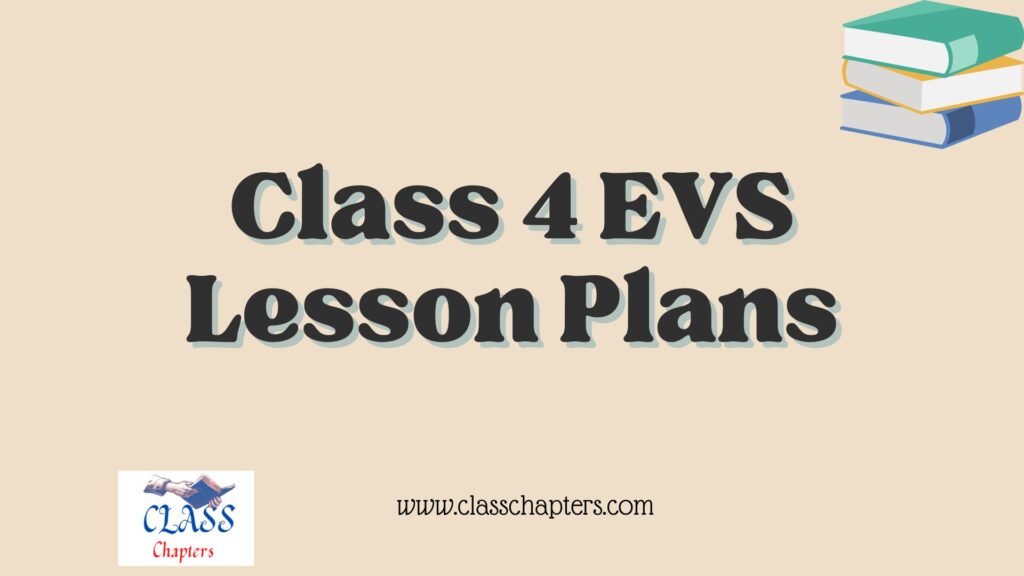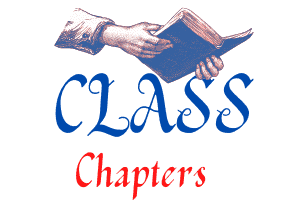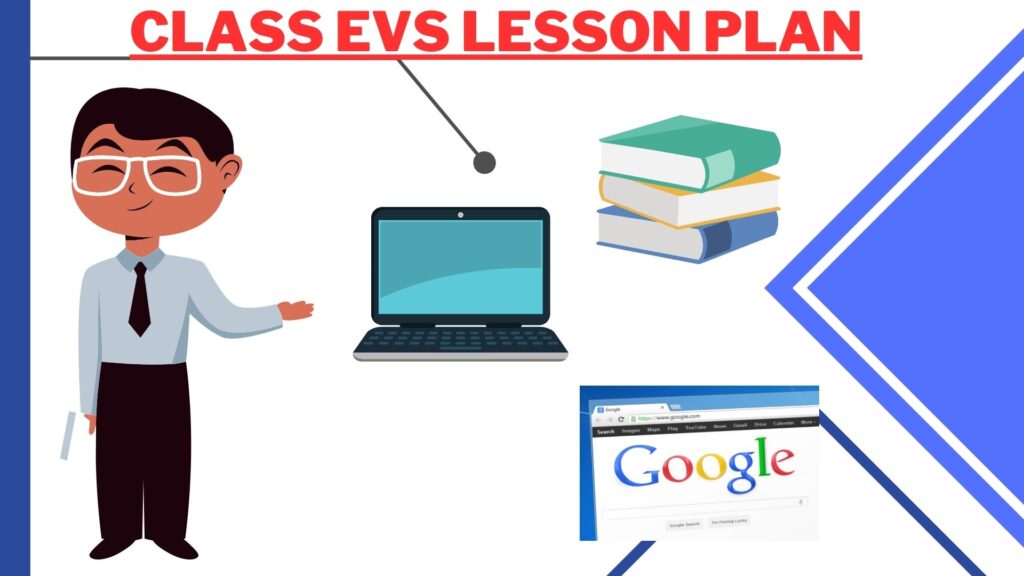
Dear Teachers and Educators, we are presenting Class 4 EVS Lesson Plans for your class.in word and pdf format, These lesson plans are very useful for teachers of KVS, CBSE schools, and other schools following the syllabus of NCERT .. Our Lesson Plans are according to the latest pattern of KVS and CBSE.
Class 4 EVS Lesson Plans
Welcome to an engaging and interactive journey through the world of Environmental Studies (EVS) for Class 4 students, aligned with the NCERT-KVS curriculum. These carefully designed lesson plan aims to foster a sense of curiosity, understanding, and appreciation for the environment among young learners.These lesson plans are suitable for all teachers of class 4 EVS in CBSE schools ,KVS and schools following NCERT syllabus.
In today’s rapidly changing world, it is crucial for students to develop an awareness of the environment and its interconnectedness with our lives. Through these lesson plans, we strive to provide a holistic learning experience that encompasses various aspects of EVS, such as environmental conservation, biodiversity, natural resources, climate change, and sustainability.
Class 4 EVS Lesson Plans – Syllabus
Class 4 Evs Lesson plans syllabus is according to the latest syllabus of NCERT. As per latest syllabus of NCERT there are 27 chapters in class 4 EVS book.
- 1.Going to School
- 2.Ear to Ear
- 3.A Day with Nandu Class 4 EVS Lesson Plans
- 4.The Story of Amrita
- 5.Anita and the Honeybees
- 6.Omana’s Journey
- 7.From the Window
- 8.Reaching Grandmother’s House
- 9.Changing Families
- 10.Hu Tu Tu, Hu Tu Tu
- 11.The Valley of Flowers
- 12.Changing Times Class 4 EVS Lesson Plans
- 13.A River’s Tale
- 14.Basva’s Farm
- 15.From Market to Home
- 16.A Busy Month
- 17.Nandita in Mumbai
- 18.Too Much Water,Too Little Water Class 4 EVS Lesson Plans
- 19.Abdul in the Garden
- 20.Eating Together
- 21.Food and Fun
- 22.The World in my Home
- 23.Pochampalli
- 24.Home and Abroad Class 4 EVS Lesson Plans
- 25. Spicy Riddles
- 26.Defence Officer : Wahida
- 27.Chuskit Goes to School
Class 4 EVS Lesson Plans – Content
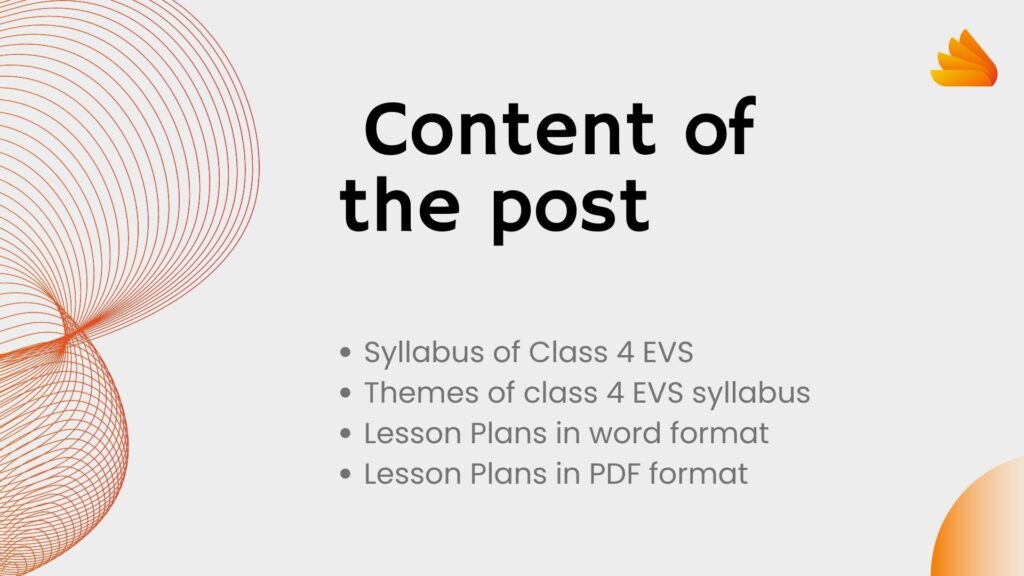
Class 4 EVS Lesson Plans -Links
| S.No. | Chapter | Word | |
| 1 | Chapter 1 | Link | Link |
| 2 | Chapter 2 | Link | Link |
| 3 | Chapter 3 | Link | Link |
| 4 | Chapter 4 | Link | Link |
| 5 | Chapter 5 | Link | Link |
| 6 | Chapter 6 | Link | Link |
| 7 | Chapter 7 | Link | Link |
| 8 | Chapter 8 | Link | Link |
| 9 | Chapter 9 | Link | Link |
| 10 | Chapter 10 | Link | Link |
| 11 | Chapter 11 | Link | Link |
| 12 | Chapter 12 | Link | Link |
| 13 | Chapter 13 | Link | Link |
| 14 | Chapter 14 | Link | Link |
| 15 | Chapter 15 | Link | Link |
| 16 | Chapter 16 | Link | Link |
| 17 | Chapter 17 | Link | Link |
| 18 | Chapter 18 | Link | Link |
| 19 | Chapter 19 | Link | Link |
| 20 | Chapter 20 | Link | Link |
| 21 | Chapter 21 | Link | Link |
| 22 | Chapter 22 | Link | Link |
| 23 | Chapter 23 | Link | Link |
| 24 | Chapter 24 | Link | Link |
| 25 | Chapter 25 | Link | Link |
| 26 | Chapter 26 | Link | Link |
| 27 | Chapter 27 | Link | Link |
Key components of a lesson plan
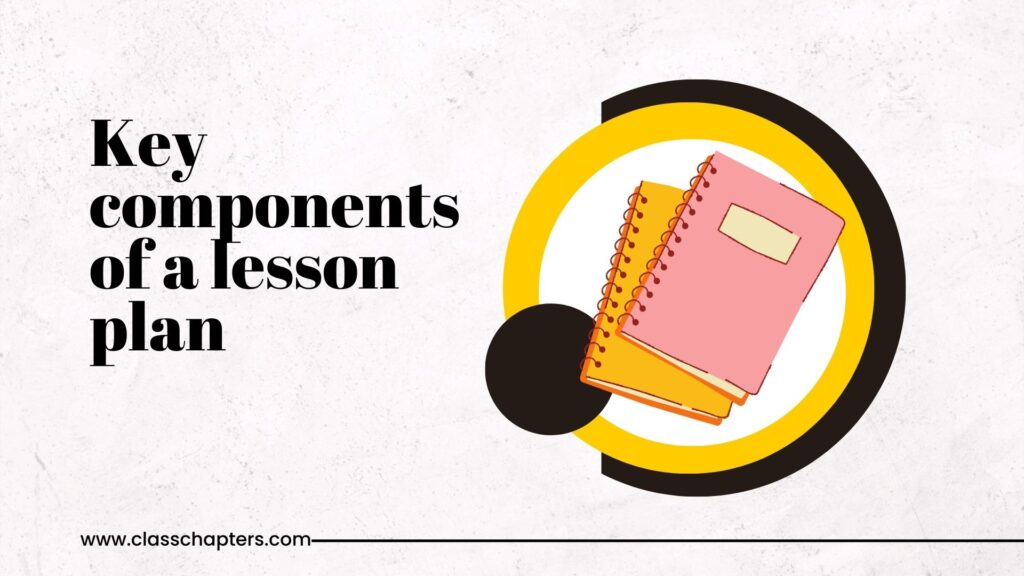
- TLOs : Clearly defined and measurable targetted learning outcomes what students should be able to achieve or learn by the end of the lesson.
- Introduction of lesson plan in classroom: A hook or engaging activity that captures students’ attention and motivates them to participate actively in the lesson.
- Check of previous knowledge of child: A brief assessment or review of students’ existing knowledge related to the topic to activate prior knowledge and establish connections with new content.
- Instructional Sequence: The main body of the lesson, organized in a logical and sequential manner. It includes:a. Content Presentation: Introduce new concepts or skills through explanations, demonstrations, visuals, or multimedia resources.b. Guided Practice: Provide opportunities for students to practice new knowledge or skills with support and guidance from the teacher.c. Independent Practice: Assign tasks or activities that allow students to apply what they have learned independently or in small groups.d. Differentiation: Incorporate strategies to accommodate diverse learners, such as providing extra support or extension activities, adapting materials, or using cooperative learning structures.
- Assessment/Evaluation: Include formative or summative assessment strategies to gauge student understanding and progress. This can be done through questioning, observation, quizzes, discussions, or other appropriate assessment methods.
- Closure: A summary or concluding activity that helps students reflect on what they have learned and how it connects to their prior knowledge or real-life situations.
- Homework/Extension: Optional assignments or tasks that extend the learning beyond the classroom and encourage further exploration or application of the concepts.
- Resources and Materials: List any required resources, materials, or technology that will be used during the lesson, such as textbooks, worksheets, multimedia, or manipulatives.
- Time Management: A well-defined timeline or schedule to ensure that each component of the lesson is adequately addressed within the available class time.
- Adaptations and Modifications: Consider any specific adaptations or modifications needed for students with special needs or learning differences to ensure inclusive instruction.
- Reflection: Allocate time to reflect on the effectiveness of the lesson, student engagement, and areas for improvement. This reflection can guide future lesson planning and instructional decisions.
Our Lesson Plans consist all these key features of a good lesson plan.
Our other resources
HINDI-RIMJHIM LESSON PLAN LINKS
- CLASS 1 HINDI RIMJHIM LESSON PLAN
- CLASS 2 HINDI RIMJHIM LESSON PLAN
- CLASS 3 HINDI RIMJHIM LESSON PLAN
- CLASS 4 HINDI RIMJHIM LESSON PLAN
- CLASS 5 HINDI RIMJHIM LESSON PLAN
ENGLISH-MARIGOLD LESSON PLAN LINKS
- Class 1 ENGLISH MARIGOLD LESSON PLAN
- Class 2 ENGLISH MARIGOLD LESSON PLAN
- Class 3 ENGLISH MARIGOLD LESSON PLAN
- Class 4 ENGLISH MARIGOLD LESSON PLAN
- Class 5 ENGLISH MARIGOLD LESSON PLAN
EVS-LOOKING AROUND LESSON PLAN LINKS
- CLASS 1 EVS LOOKING AROUND LESSON PLAN
- CLASS 2 EVS LOOKING AROUND LESSON PLAN
- CLASS 3 EVS LOOKING AROUND LESSON PLAN
- CLASS 4 EVS LOOKING AROUND LESSON PLAN
- CLASS 5 EVS LOOKING AROUND LESSON PLAN
MATHS-MAGIC LESSON PLAN LINKS
- CLASS 1 MATHS-MAGIC LESSON PLAN
- CLASS 2 MATHS-MAGIC LESSON PLAN
- CLASS 3 MATHS-MAGIC LESSON PLAN
- CLASS 4 MATHS-MAGIC LESSON PLAN
- CLASS 5 MATHS-MAGIC LESSON PLAN
Class 3 Session Ending Exam
- Class 3 Hindi Session Ending Exam
- Class 3 English Session Ending Exam
- Class 3 Maths Session Ending Exam
- Class 3 EVS Session Ending Exam
Class 4 Session Ending Exam
- Class 4 Hindi Session Ending Exam
- Class 4 English Session Ending Exam
- Class 4 Maths Session Ending Exam
- Class 4 EVS Session Ending Exam
Class 5 Session Ending Exam
- Class 5 Hindi Session Ending Exam
- Class 5 English Session Ending Exam
- Class 5 Maths Session Ending Exam
- Class 5 EVS Session Ending Exam
